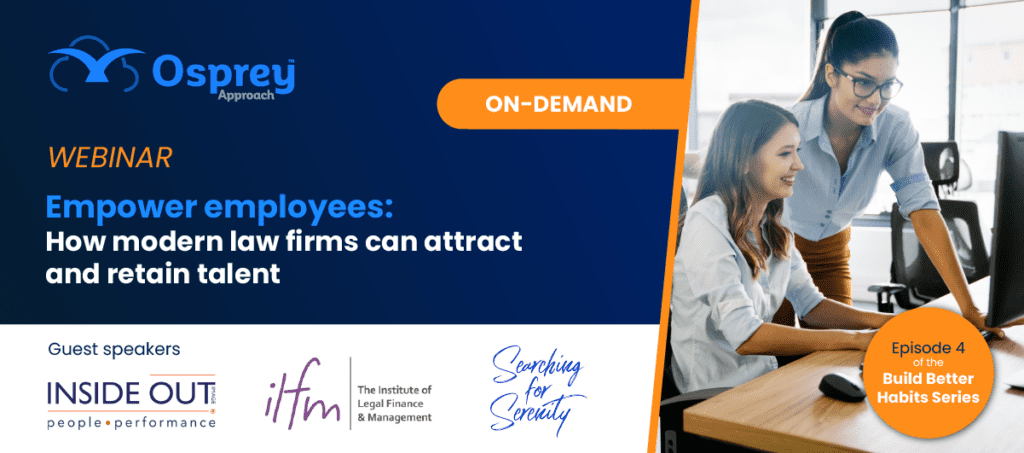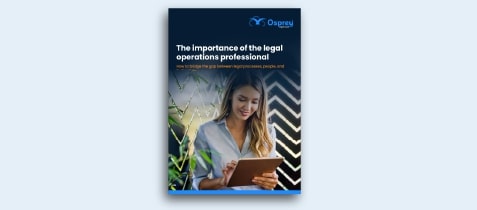Contents
How modern law firms can attract and retain talent
For the last episode of the Build Better Habits webinar series, we were joined by Tim Kidd, CEO at The Institute of Legal Finance & Management (ILFM), Joanna Gaudoin, Director at Inside Out Image, and Leah Steele, Owner of Searching for Serenity. Our expert panel shared their practical tips and advice on how law firms can implement an effective workplace culture that empowers employees, retain talent, and improves overall performance.

What does an ‘empower employees’ mindset mean?
We begin by asking our panellists what an empower employee mindset means for modern law firms, and they all shared similar ideas about communication, contribution, value, and safety.
Joanna began by explaining the importance of career development for empowerment: “Put some time in the diary every week to work on your career. It’s important that the employer is supportive of that so individuals can ask about their current skill gaps, or how they can progress.”
Tim agrees and explains that’s the reason behind the ILFM motto: knowledge, support, and confidence. “We encourage members to concentrate on training and qualifications, because knowledge will lead to improved confidence, and people with confidence perform their jobs better.”
Leah emphasises the importance of learning from everyone in the team: “For me, the empower employee mindset is about unlocking the traditional hierarchy structure that says the person at the top knows more, and instead widening it out to say, ‘what do we all know?’… We can get a much richer source of information that way.”
For everyone in the firm to contribute, individuals need to feel safe, and Joanna comments that, “people need to feel safe to speak up about the negative stuff too.” Tim believes a key element of empowering employees is “identifying everybody as important in the organisation.” And to help create an inclusive environment he recommends “getting to know each individual employee. It’s important to be able to understand the team you have.”
Having a human approach seems like an obvious element of creating a supportive workplace culture, but that can often get overlooked when challenging decisions come into play around profitability, operations, or risk. Tim reflects on a recent experience where “somebody said to me ‘you’re making an emotional decision’ and my response was, ‘is there any other decision to make?’. Every single decision we make has an emotional element and taking the emotion out can be a dangerous thing.”
How a change in mindset can help with current retention and hiring challenges
“You can’t keep doing the same thing and expect a different outcome.” Leah discusses the importance of questioning existing processes when adopting a different mindset. “We need to ask the right questions like, ‘what haven’t we considered?’.
“There needs to be time to reflect and consider change. It’s about having a curious mindset.”
It requires less resource to retain talent than it does to hire new, so Joanna reflects on the importance of fostering better relationships with your team. “Relationships are key and it’s about making that time to ask about people’s day, so they feel a valued member of the firm.”
To implement an empower employee mindset, people often focus on others first, but Joanna discusses the importance of looking inwards and understanding yourself. She explains, “we need to start with ourselves and understand the impact we’re having and our own strengths before we can work better with others.” Training and skills development is key for progression, but don’t underestimate the importance of emotional development and social skills, Joanna believes that, “people need to be self-aware and consider how they’re actions are being perceived… have self-control to make sure they don’t immediately react on anger… understand what motivates them… have empathy and be able to have difficult conversation.”
Tim explores how ILFM empower their employees, “it’s about people feeling valued and recognition is a huge thing as far as I’m concerned.
“You need to be understanding, caring, [and] ensure they have the right equipment, training, and support.” Joanna agrees and explains it’s important that firms can differentiate themselves on more than just salary, so setting up the right positive culture has an impact. “Firms have to make sure people feel part of the culture, which helps increase loyalty to the organisation.” She suggests having mentor programmes, continuous training and development, and career progressions plans because they help increase loyalty to the firm.
Six habits law firms should adopt
The panel agree that modern law firms should focus on the following habits when implementing an empower employee mindset:
- Increase channels for feedback
Employees need to feel safe when proving feedback, especially if it’s negative. Leah advises providing multiple options for providing feedback to encourage communication. “For example, have an external consultant come in, someone that’s anonymous, confidential, and removed from the environment. Allow email feedback, ask surveys, and provide anonymous structures to give people safety.”
2. Model the desired behaviour
Improved human connection happens through vulnerability. Positive change is a result of curiosity. Both behaviours are required for a more effective workplace culture. Leah suggests that to effect a culture shift, the desired behaviour needs to be modelled by managers. “Transparency, vulnerability, and curiosity needs to be visible. Managers should share experiences when they weren’t sure or got things wrong. You shift the culture by modelling it for others to see.”
3. Regular feedback
A report by LawCare showed regular catch-ups were the most effective support measure in law firms. Joanna says that “If you’re only giving feedback once a year it’s hard to remember what happened months ago. Feedback isn’t going to be specific enough because it’ll lack examples and clarity, and nobody can act on that.” She explains how regular feedback will enable everyone to develop and improve.”
4. Eliminate fear
“Fear in a workplace is awful; there’s a huge difference between respect and fear.” Tim stresses the importance of eliminating fear from your culture and advises the way to do that is by encouraging people to ask questions “and the way you encourage people to ask is to say yes often.”
5. Team engagement
Joanna believes dedicating time to team and firm-wide engagement events, or activities, is crucial for better communication and collaboration. It’s how individuals will get to know each other which then helps strengthen team performance.
6. Genuinely listen
Joanna advises “ask questions of your employees that you genuinely listen to the answers, rather than listening to respond.” Humans want to feel heard to feel part of a group, and if you’re only listening to immediately offer advice or add your opinion, employees can feel overlooked.
How to create the right culture and environment for an effective team
Changing a firm’s culture isn’t an overnight process; it’s a gradual long-term strategy that involves a switch in mindset, success measures, and communication styles. Tim explains, “yes, we must think about profits, getting the client work done, productivity etc. But all those things are improved by empowering your workforce and ensuring they feel appreciated and recognised. The other outcomes will happen automatically.”
Joanna and Leah provide practical tips on where to start when creating the right environment for an effective team and both emphasise the importance of setting clear expectations. Joanna says, “let people know what is expected of them – be specific, not vague.” Leah continues, “provide clarity and tangible KPIs so it’s really clear what you’re asking for.”
Management or team leads helping with skill development is just as important as external courses or qualification, Joanna says, before adding that she “often sees senior lawyers look at work and if it’s not what they want they just change it and never take the person through why they changed it. That does not help develop individuals and it really demotivating. It’s worth the time investment because in the future a similar task will be completed correctly. Trust people and make time to help them develop.”
Tim sums up the panellists’ thoughts by providing a motto not just for the workplace, but for life in general: “Just be kind. In every way you can, be kind and that will filter through and improve everything that you do.”
Empower employees to build an effective culture for long-term success
This episode highlighted the importance of having a human approach to your operational strategy. As well as focusing on your clients’ needs, invest resource into ensuring a supportive, honest, and collaborative culture is present throughout your firm to improve retention and help hire new talent.
The effectiveness of your firm’s culture will determine the longevity of your business. And its effectiveness is determined by the behaviours modelled by management, the safety to share ideas and feedback, and the communication and progression plans discussed internally. Empowering employees will ensure your teams are motivated, passionate, and loyal to the firm, which in turn increases productivity, profitability, and client satisfaction.
Having an empower employee mindset is one of four habits that modern law firms should adopt for long-term success. We’ve covered all four habits in our Build Better Habits webinar series, which you can watch on-demand now.





